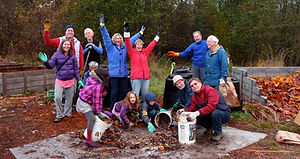
How We Organize Ourselves
All owners are members of community council and can volunteer for any teams they are interested in participating in. Renters can participate in Council and teams but cannot block decisions.
Community Council meets monthly and all members are encouraged to attend whenever possible. Council makes decisions outside of the operating budgets of the teams that handle day to day operations. Council also explores issues of community development like vision, values, and governance.
Teams meet and do their work according to their own functions and report to council as needed.

Some guiding principles behind this model:
-
Visualize a circular structure of interdependent teams around our central Community Council
-
Keep on-going feedback in the structure so that a lengthy re-organizational review is not necessary in the future
-
Assume people want to volunteer
-
Make team mandates less overwhelming
-
Make room for those people who want to help but don’t do meetings
-
Minimize bureaucracy & unnecessary steps
-
Empower teams with clear mandates & the Decision-Making Criteria questions
-
Focus on optimizing communication
-
Encourage individual responsibility
-
Highlight the tasks that must be done and will cost us in higher strata fees if we don’t to do them ourselves – this way all of us, and any new residents are clear on how volunteerism is linked to our enjoyment of low strata fees
Community Council
-
This is the ultimate authority for everything that happens at Creekside
-
All owners and families are members of Community Council
-
Community Council will meet at least quarterly for business meetings
-
Community Council will meet as required for community discussions in order to air ideas fully before Community decisions are solicited & in order to maintain the emotional health of the Community as a whole
-
Community Council delegates the maintenance of Creekside Commons Cohousing to the teams
Team Principles
-
Membership is open to all Creekside residents at all times
-
One person will be the “contact” for each team. That person may self-select or be appointed by the team members. This person will have the signing authority for reimbursements & be the “contact” name on team documents
-
Teams will undertake tasks described in the team mandate – if unable to meet the mandate they will bring the issue to Community Council for review of the resources in the community or to review the team mandate
-
Clear mandates are recorded & posted
-
Teams are responsible to operate within the budget assigned to the team at the time of approval of the yearly budget
-
When deciding on a new action, teams will use the Decision Making Criteria questions to determine 1) if they have prepared the community sufficiently for such a decision (within team’s task mandate) or 2) if the item should be taken to a Community Council meeting
-
Teams will post agendas to inform the community of upcoming consideration of initiatives & proposed actions that impact common spaces
-
Teams will take (and post) minutes/reports of meetings at which decisions that affect the community are considered or made
-
Formal meetings are not a requirement for all teams, nor for any team member
-
Teams will report to Community via minutes or quarterly reports (hard copy posted & electronic copy distributed/posted on Google Drive)
-
The “contact person” signs reimbursement forms for team expenses before going to Finance & Administration
-
No team members are expected to act as surrogates or ombudspersons. If something appears to need attention, the individual in our community that notices it will bring the item to the team “contact” who will assist that individual to bring the concern forward in the appropriate forum (team/Council)
-
Ad Hoc Special Project teams will form by Community Council direction and dissolve upon completion of projects rather than being added to existing team
-
Have fun. Join the team that fits your passion! Or choose a couple of tasks & tell the “contact person you’re taking care of them!